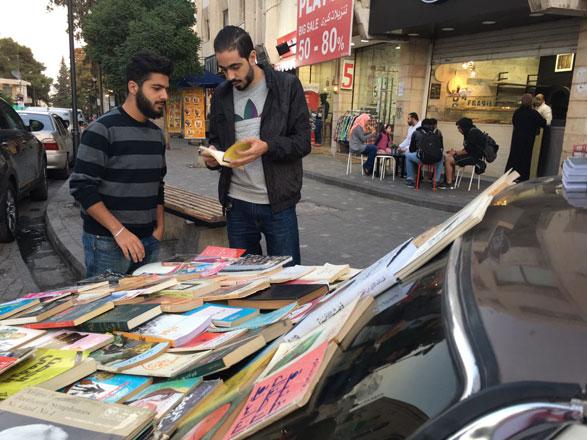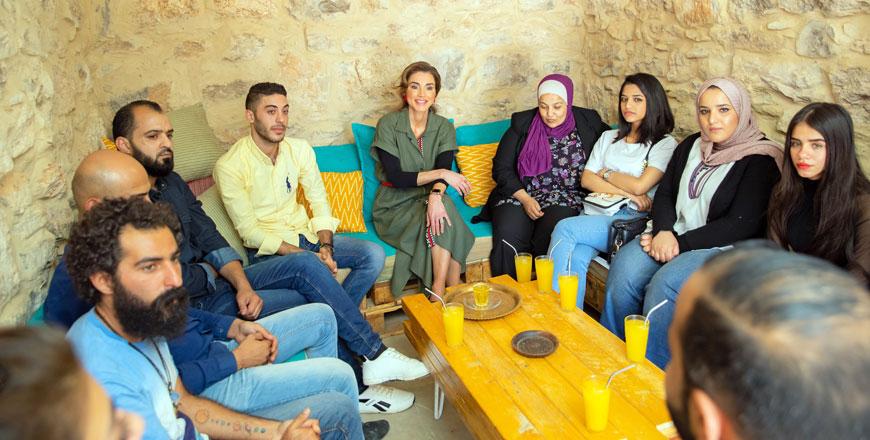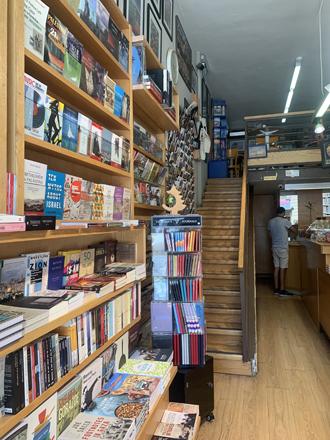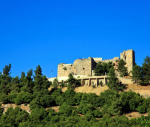You are here
Kawon bookstore in Madaba promoting reading culture since 2016
By Yasmeen Kanaan - May 12,2019 - Last updated at May 13,2019
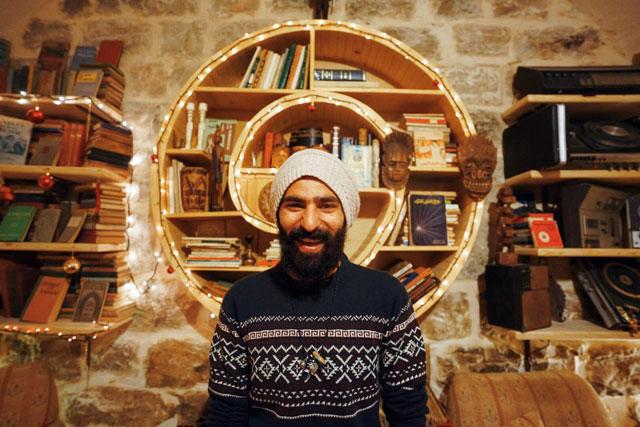
In this photo taken in 2016, the founder of Kawn, Gaith Bahdousheh, is seen at his first bookshop (Photo courtesy of Super Nova)
AMMAN — Selling books might not be the path applauded by society, yet according to entrepreneur Ghaith Bahdousheh, there is more of courage and passion to quitting your job rather than just being unemployed.
Kawon, a socially active bookstore and a cultural space in Madaba, has been promoting the reading culture since its start as an initiative of selling books on the streets since 2016.
While sites and ruins are human heritage, what is left behind as legacy are not the rocks but rather the books, knowledge and discoveries that are passed down generations.
“Would ruins enrich your life? They’ll teach you about history, that’s good, but will they take you somewhere else?” Bahdousheh, founder of Kawon said in an interview with The Jordan Times.
According to Bahdousheh, what a community values can be seen through the public spaces created. Noticing the lack of libraries, Bahdousheh wanted to be a part of projecting the local community forward by spreading the habit of reading and creating the spaces for it.
“While I did a market survey in Madaba on why there are no bookshops, I found out that only three cities in Jordan have bookshops: Amman, Aqaba and Irbid. There have been some start-ups in Zarqa, but they failed and closed down.”
The story began in 2015, when, at that time, the 25-year-old young man was in downtown Amman buying books, sitting on the side of the street and staring at a bookshop.
In January 2016, Bahdousheh left his four-year career as a risk analyst at an insurance company to become a “free man”. Right afterwards, Bahdousheh started working in a bookshop to learn about the book world, with the hopes of creating his own.
Bahdousheh began selling books on the streets from downtown to Luweibdeh in Amman. With a very basic display using chairs and coffee tables, lent by a restaurant owner who happened to be his friend, Bahdousheh started displaying his books out to the public.
“From the first day, I called my initiative ‘Books on the Road’; which was my social initiative to finance the bookshop in Madaba.”
Left with nothing but the pavement after the owner, who lent him the tables and chairs, had closed his restaurant, Bahdousheh realised that the pavement was not doing enough justice for such a valuable asset. From that moment, the idea of using his own car — Nancy — for display hit him.
“While looking at my car and my books, inspiration hit me. I recognised that the car is a big display area, I needed space for the books, and the books did not look good on the pavement; it’s not a nice way to sell books. When I displayed them on the car, it was a totally different concept, and the magic started.”
From this point forward, Bahdousheh gave his project another intriguing appeal, and from selling these books, he was capable of funding for his own bookshop.
He said he hopes for governmental support as, at the end of the day, the bookshop is a cultural space built for the well-being of its local community.
“I have received a lot of donations from people that I don’t know. Those donors are part of the reason behind the existence of this bookshop.”
From books on the road, to a cave-like bookstore, to running a cultural community centre, the vendor displays books in 20 different languages. He offers alternative options of exchanging books, knowing that books are a luxury with its usual high costs.
“I can exchange books to encourage people to read more, since books are a luxury rather than an essential product in people’s lives.”
He said that of the most challenging aspects of his journey was the judgmental societal view of him as a man selling on the streets.
“The view of society of the guy who sells books on the street was a challenge, but I am not afraid of judgments. It’s a journey that consumed time, it was even physically consuming as my car has finally broken down of over-use.”
Qais Maaya, who started out as one of the bookshop’s loyal clients, became a co-founder in 2018.
“This is a fun, intellectual and independent space. Our aim is not materialistic. Our aim is to bring new ideas and new experiences that have not been suggested before, cultural necessities that no one has tackled before”, Maaya said.
In response to a question by The Jordan Times on why naming the bookshop with Kawon (Arabic for universe), Bahdousheh said: “Books contain the whole universe. There are no secrets hidden from anybody, all secrets are found in books.”
With an open space and a garden in the back yard of the bookstore, Bahdousheh looks forward to implementing gardening workshops in the upcoming future; to teach youth where their food comes from.
Bahdousheh also opens his centre to host musicians as well as poets and writers in an event he calls “unplugged”, inspired by his own passion for playing the guitar.
Related Articles
AMMAN — On the streets of the capital’s old neighbourhoods of Jabal Amman and Jabal Luweibdeh, one old Mercedes car has been grabbing the at
AMMAN — Her Majesty Queen Rania on Sunday joined a group of young men and women at Kawon bookshop in Madaba, a creative space known for prom
OCCUPIED JERUSALEM — An unassuming bookshop sits at its centre of the bustle and chatter of Salah ed-Din Street in East Jerusalem, with its


